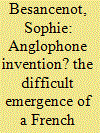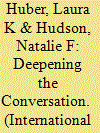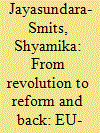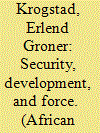| Srl | Item |
| 1 |
ID:
114755


|
|
|
|
|
| Publication |
2012.
|
| Summary/Abstract |
The concept of security sector reform (SSR) was first formulated by UK development actors. Since 2008, France has officially adopted an SSR strategy and promoted the concept at the European level during the country's 2008 EU Presidency. However, what appears on paper to resemble full support from French institutions is in fact more complex. If the anglophone roots of the policy initiative do not seemingly explain its lack of institutionalization in the French context, it would appear that the difficulty faced by the French administration in finding a whole-of-government agreement on what the content of SSR should be, does.
|
|
|
|
|
|
|
|
|
|
|
|
|
|
|
|
| 2 |
ID:
171208


|
|
|
|
|
| Summary/Abstract |
Over a decade of security force assistance (SFA) initiatives to build an effective Somali National Army (SNA) failed because of the interrelated effects of political, contextual and operational challenges. The key political challenges were interest asymmetry between international actors and Somali elites, insufficient focus on institution-building and a lack of donor coordination. The principal contextual challenges in Somalia were the legacies of two decades of state collapse and the negative effects of clan dynamics. The main operational challenges were building an army while simultaneously fighting a war, the complexities of military integration, and the severe capability gaps afflicting the SNA.
|
|
|
|
|
|
|
|
|
|
|
|
|
|
|
|
| 3 |
ID:
169243


|
|
|
|
|
| Summary/Abstract |
Scholarship on international police reform and Women, Peace and Security (WPS) has flourished in the last decade and the potential for engagement across these two bodies of literature is promising. Given the increased use of police personnel in international peace missions and emphasis on gender mainstreaming policies, the need for assessing the impact of these two trends has never been greater. Thus, this paper seeks to bridge gaps between the mainstream policing scholarship and feminist scholars focused on post-conflict peacebuilding police reforms. We explore how feminist scholars can engage with policing literature’s technocratic language and ‘in the field’ experience as well as how policing scholars can interact with feminist scholars to transform traditional approaches to security in the context of the WPS Agenda. We demonstrate the benefits of increased dialogue and interaction by highlighting the common and diverging challenges in both fields in three areas: the design, implementation, and evaluation. Finally, to illustrate the dynamic intersection of these areas of study and practice, we examine the transnational policing efforts to gender mainstream the Liberian National Police (LNP) in the context of the UN Mission in Liberia (UNMIL).
|
|
|
|
|
|
|
|
|
|
|
|
|
|
|
|
| 4 |
ID:
162500


|
|
|
|
|
| Summary/Abstract |
Security Sector Reform (SSR) is an important element of the EU’s external intervention toolkit. In an increasingly uncertain global security environment, the EU has currently stepped up its SSR endeavours. However, success of these efforts largely depends on the EU’s capabilities in navigating complex context-specific challenges. In particular the EU needs to be able to simultaneously address the functional and normative-societal imperatives that underpin SSR. This article considers the case of the EU’s ongoing SSR mission to Ukraine – the European Union Advisory Mission (EUAM). It asks, what are the unique context-specific challenges faced by EUAM in Ukraine? How do these challenges influence the EU’s ability to satisfy both the normative-societal imperative of SSR through the EUAM? This article mainly relies on secondary data, and applies a “Whole of Society” approach to conflict prevention and peacebuilding (WOS). Amidst a situation of ongoing multiple armed conflicts and EU-Russian relations of mutual dependence, a key finding is that the mandate of the mission has become more narrow and exclusive by sacrificing vertical coherence and the normative-societal imperative. We recommend EUAM adopt a more “revolutionary” approach to SSR, by adhering to key SSR normative principles so that the mission can overcome the challenges of the unique reform environment of Ukriane. This will also make it able to contribute more meaningfully to the wider reform process in an effective and sustainable manner.
|
|
|
|
|
|
|
|
|
|
|
|
|
|
|
|
| 5 |
ID:
112127


|
|
|
|
|
| Publication |
2012.
|
| Summary/Abstract |
This article adds empirical and historical depth to the debate about security sector reform (SSR) by analysing British-led reform of the Sierra Leone Police (SLP) against the backdrop of late-colonial policing reforms. It argues that the security-development logic that frames SSR skates gingerly over a difficult problem familiar from the late-colonial period: that of investing sufficient coercive capacity in the state for it to withstand threats without simultaneously making it more effective at oppression. Whereas colonial discourse balanced the goal of introducing a civilian order against relatively specific advice on how to organize and use force in emergencies, the security-development discourse offers little guidance as to the type and level of force the police should be equipped with in the service of development. The supply of more than £1m worth of weapons and munitions to the SLP illustrates the inherent dilemma of SSR in weak states, and by strengthening the coercive capacity of the state it may ultimately jeopardize the success of police reform in Sierra Leone.
|
|
|
|
|
|
|
|
|
|
|
|
|
|
|
|